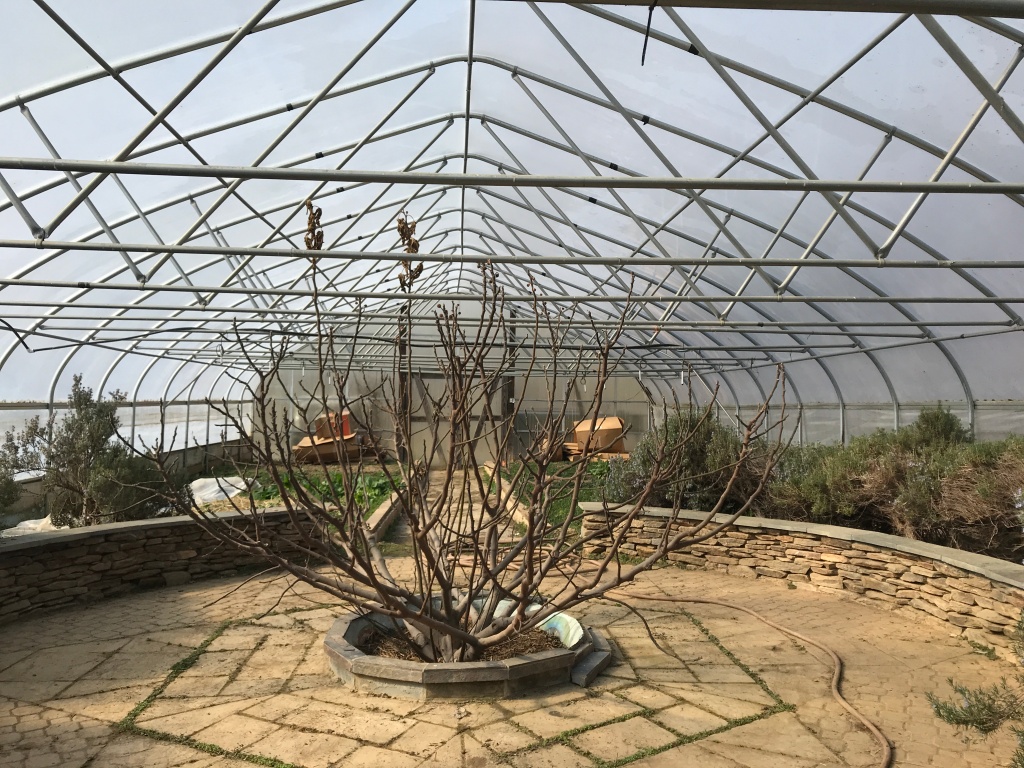[Quick a first note on the title. Did you know “tertile” is the name for a third of a year? Or a third of any whole for that matter. I didn’t. Now we do.]

Pearlstone Retreat Center( Reisterstown, MD)
Well, a lot’s happened since my last post in which I announced that I was taking this season off from growing for our CSA. Click here to go back and read all about that announcement. In short, this is the seventh season for our little farm and, according to ancient Jewish wisdom tradition, we, and the land, are entitled to a sabbatical year. Back in November, I determined to take the break, since then I have gained a lot more clarity around why, and what the year off will look like.
As I said, we’re taking the year off from the CSA. Thus far that’s meant no member signups to manage and no crop planning to fill those orders. It also means no money coming into the farm account and mounting fears that I won’t remember what I’m doing when I get back to farming next year. But I’m also enjoying getting to know myself again and in new ways – reading lots of books, practicing yoga more regularly, and working to be more present in my interactions with people. The hope, of course, is that I will make these new habits that I can carry out of the year with me into the future.
I spent a good chunk of this first tertile studying about shmita and setting the parameters for my year. Since I am not mandated to observe the practice — Jews outside of Israel are exempt per Torah — and since I’m actively Reconstructing Judaism to fit my life, needs, and desires, I figure it’s my choice how I want to mark the year. I am also finding that some of the lines I initially drew for myself are fuzzier than others. I’m erasing and replacing them as time goes on. It’s a work in progress. Which feels right.
A sabbatical is about release, but not complete rest. As the academic is freed from teaching in order to pursue research, I am free from the cultivation of food in order to cultivate values. It’s time to think about what’s really important to me in the work I’ve been doing here, where I am, and where I want to go in the future.
So far I’ve re-learned that community is key to my project. The following are a few examples.
This past tertile I shared teachings on shmita with my Jewish community here in Columbus and at an international gathering of Jewish Famers. Ironically the conference, the first for the Jewish Farmer Network, was called “Cultivating Culture.” Through these talks, I was building myself a community of support for the break.
For a few reasons, I decided to hold my annual spring plant sale. The sale brings a lot of people to the farm to see our growing space and get inspiration. The plants we send out into the word are nearly all grown to support pollinators in our community. That’s important work that can’t take a break. The bees and their friends need us. In addition, while growing seedlings requires me a bit of work, it’s not much and it’s indoors which means our soil is still getting the reset it deserves.
I also decided to have the sale because I’ve come to realize I have become addicted to having something to tend. The winter gets long, even a mild one like we had this year, and by January I was itching to put seeds in soil and watch them grow. I’m sure this says something also about my inability to be still, I’m more a walking/moving meditator than a sitting Buddha, and perhaps I should have forced myself to feel the absence of seedling season, but I didn’t. Maybe in 2027. (Incidentally, I wrote about my seedling growing practice recently for Mother Earth News.)
I will be hosting the Clintonville Farmers’ Market Kids Garden Club. For many of the same reasons as the sale. I’m happy to have the kids and their parents around and look forward to the field trips we’ll be taking as they fit nicely with my shimta goal of getting out and seeing other operations while I have the time.
And finally, I will be growing some food for me and my family and a few close friends and long-time CSA members. This was my latest decision and one I didn’t make lightly. Keeping our farm community going was part of the decision as was the COVID-19 virus which has me thinking about food security. With the threat of ongoing disruptions to all sorts of distribution channels, I just can’t justify not making plans to take care of ourselves. Just as I’m stockpiling coffee and toilet paper, I’m prepping produce for harvest. One could argue we should relaunch the CSA, echoing more loudly than ever the legacy of the Victory Garden movement. If things continue to go downhill perhaps we will. But in the meantime, if you have a patch of earth you can plant, do it. Then tend it as closely as you do your hand-washing routine.







